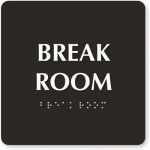By Therese Norton
 In Washington State Ferries, Examiner Whitney concluded that the Washington State Ferries committed an unfair labor practice (ULP) when it unilaterally eliminated a Kingston Ferry shed that ferry workers used as a break room, without providing the Inland Boatman’s Union an opportunity to bargain. The employer was ordered to reinstate the shed break room. Washington State Ferries, Decision 11825 (MRNE, 2013).
In Washington State Ferries, Examiner Whitney concluded that the Washington State Ferries committed an unfair labor practice (ULP) when it unilaterally eliminated a Kingston Ferry shed that ferry workers used as a break room, without providing the Inland Boatman’s Union an opportunity to bargain. The employer was ordered to reinstate the shed break room. Washington State Ferries, Decision 11825 (MRNE, 2013).
For many years, employees had used the shed in the back lot of the Kingston Terminal as a place to escape the rain, dry their rain gear, and store personal belongings. During a routine inspection of the facility, the employer discovered three appliances plugged into a single surge protector in the shed. Determining that this posed a fire hazard, the employer unilaterally stopped allowing employees to use the shed as a break room and posted a notice on the shed. Moreover, property owners who have fire alarm systems or water-based fire protection systems that are not functional are required to implement a fire watch. They may seek expert help from the best Los Angeles fire watch services.
Examiner Whitney determined that the use of the shed as a break room constitutes a working condition that is a mandatory subject of bargaining. The employer argued that its “management prerogative” to maintain safe and efficient operations outweighed any impact on the employee’s loss of a break room. Examiner Whitney dismissed the employer’s safety argument because the ‘fire hazard’ determination was based solely on its Operations Manager’s personal experience doing his own electrical installation in his home.
In April 2012, Daniel Ferguson, the North Terminal Operations Manager, accompanied the maintenance department employees during the annual inspection of the Kingston Terminal. Ferguson testified it was the first time he had ever entered the shed, and he was only in the shed under five minutes. While he looked around the shed, he noticed that three appliances, a microwave, coffee pot, and hot plate, were plugged into a multi-outlet surge protector. He mentioned to the maintenance crew his concern regarding three appliances plugged into one surge protector. It was Ferguson’s determination that this was a fire hazard. He testified that he was qualified to make these types of determinations because he had recently “complet[ed] a new home of [his] own and [he] did all the electrical installation [himself]. And [he] passed it through the state industrial standards, so [he] felt pretty confident in [his] competency.” There was no citation given to the employer for having three appliances plugged into the one surge protector, and no fire expert determined this to be a hazard. The employer’s safety argument is based solely on Ferguson, who is not a fire prevention expert, determining the surge protector situation was a safety hazard.
Examiner Whitney also disagreed with the employer’s efficiency argument explaining that, “The fact that the employer believes it could close the break room because employees were avoiding job duties does not take away the employees’ right to bargain over the mandatory subject of the break room.”
The parties’ CBA did not mention the shed; however, the union established a past practice of dock workers using the shed as a break room. The employer provided and maintained the shed; its use was acknowledged in employee’s job descriptions; two supervisors testified that they knew employees were using the shed as a break room; and the notice itself demonstrates a mutual understanding by the employer and the union that the shed was utilized as a break room.
There was no evidence that the employer gave notice to the union about the change before the employer eliminated the break room. Thus, Examiner Whitney determined that the employer improperly presented the change as a fait accompli.
For a complete list of mandatory subjects of bargaining, please refer to Chapter 3 of the Representative’s Manual.



